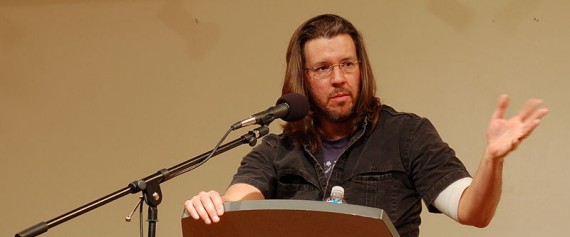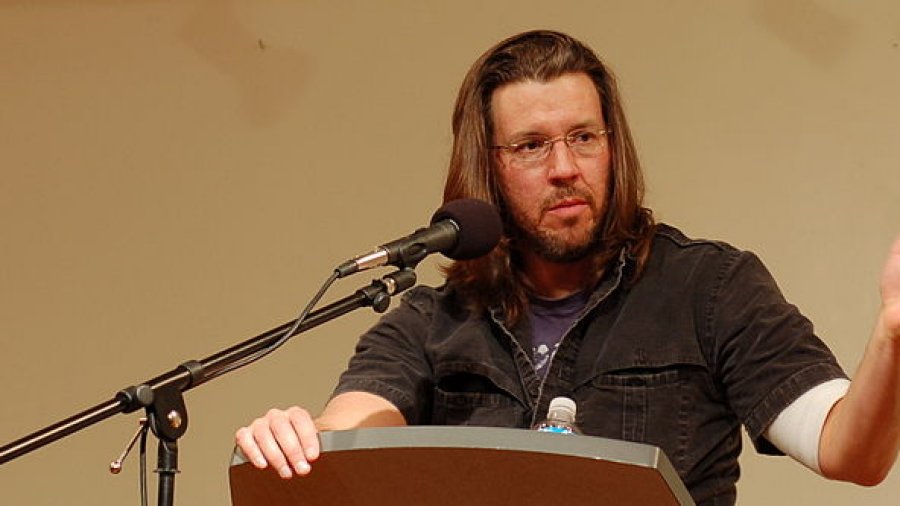“That feeling of having to obey every impulse and gratify every desire seems to me to be a strange kind of slavery. Nobody talks about it as such, though.”
The term “genius” is tossed around a lot, but most would agree that the late David Foster Wallace was worthy of the title. Wallace was a novelist, essayist, and short story writer who rose to literary fame before tragically taking his life in 2008 due to a lifelong struggle with depression.
I’ve written before about Wallace’s unforgettable commencement speech in 2005 at Kenyon College, and I’ll certainly write more about him in the future.

DFW gives a reading circa 2006. Via Wikimedia Commons
If you’re familiar with his work, you know that DFW was exceptionally and almost painfully aware of the finer details of both himself and his surroundings. One would be hard-pressed to find an individual whose fingers have been pressed more squarely to the heartbeat of late-20th, early-21st century American culture than were those of Wallace.
In spite of his renown and his brilliance, Wallace carried himself with an air of cautious humility, clearly wanting very badly not to convey self-importance or elitism. Many who call his image to mind probably think first of the bandannas (to soak up his excessive perspiration) and long, flowing hair, two iconic aspects of his long-time appearance.
Wallace’s subdued, sensitive nature is evident in a 2003 interview he did with a German television broadcaster. He speaks softly and often criticizes himself for over-simplifying complex topics. And yet, in the midst of this, Wallace dispenses a great deal of insight on wide-ranging subjects.
The hour-and-a-half-long interview is remarkable in its entirety, but I am particularly enamored with one segment in which Wallace discusses American culture:
On a Paradox of American Cultural Values
Wallace highlights two central and conflicting messages of the American value system:
“Being what you call grown-up isn’t a lot of fun a lot of the time. There are things you have to do. There are things you want to do that you can’t do for a variety of reasons. And I think that for young people in America there are very mixed messages from the culture. There’s a streak of moralism in American life that extols the virtues of being grown up and having a family and being a responsible citizen. But there’s also the sense of do what you want, gratify your appetites — because when I’m a corporation appealing to the parts of you that are selfish and self-centered and want to have fun all the time, (this) is the best way to sell you things.”
Wallace points out that in the United States there is a sense that one has a duty to fulfill after a certain age—namely, the duty to settle down, start a family, work full-time, be responsible, etc. This coming-of-age model is pervasive throughout the states, and many people adhere to it as if it were divinely mandated.
Wallace sets this idea in contrast to another quintessential idea in the American paradigm—that you should “do what you want”. Wallace notes that this message arises (at least in part) from the economic model in the United States. Capitalism thrives when people buy things, and a damn good strategy to get people to buy things is to convince them that happiness and freedom lie in doing and spending whatever they please, whenever they feel like it.
The simultaneous influence of these two messages is paradoxical in that one suggests that we should live in accordance with the traditions of the past—i.e. in a way that other people determined to be valuable—while the other suggests that we should live according to our every personal whim and fancy.
The conflict between these two structures of living becomes increasingly problematic as life progresses. When you reach a certain age, as Wallace notes, “There are things you have to do. There are things you want to do but can’t do for a variety of reasons.” Regardless of our mindset toward fulfilling the duties of adulthood, we are required (unless we were born into exceptional circumstances) to perform certain duties—work, pay taxes, buy groceries, etc.
Upon arriving at this juncture, many of us seem to find that the cultural ideal of becoming a “grown-up” with a family and a mortgage and the whole shebang isn’t quite as great as we once thought. Wallace puts it frankly when he says, “Being what you call grown-up isn’t a lot of fun a lot of the time.” And I think that upon confronting this stifling situation, we are easily compelled to embrace the other side of the paradox—i.e. to assert our “freedom” by doing whatever we want right now.
That is, as adults, in the times when we aren’t providing or looking after or working or running errands-—the nights and weekends—we try to make up for our apparent lack of freedom by spending and doing whatever we crave, by seeking highs and loud, flashy forms of entertainment. In doing this, it seems we’re often bouncing from one extreme to the other—from utter submission to duty to an excessive display of “free” will.
On Being a Slave to One’s Impulses
According to Wallace, though, even what many would deem the ultimate expression of freedom (following every impulse, gratifying every desire) might be a bizarre sort of servitude:
“American economic and cultural systems that work very well in terms of selling people products and keeping the economy thriving do not work as well when it comes to educating children or helping us help each other know how to live — and, to be happy, if that word means anything. Clearly it means something different from whatever I want to do — I want to take this cup and throw it right now, I have every right to, I should! We see it with children — that’s not happiness. That feeling of having to obey every impulse and gratify every desire seems to me to be a strange kind of slavery. Nobody talks about it as such, though. We talk about the freedom of choice and you have the right to have things and spend this much money and you can have this stuff. Again, saying it this way, it sounds to me very crude and very simple.”
Wallace explains that when we shift into this mode where all we do is satisfy whatever fleeting desire seizes us, we’re indulging a mindset that is characteristic of children. For Wallace, it seems that to gratify every impulse is to become a slave to the urges of the moment. He suggests that this is not a path to happiness (“if that word means anything”).
What to Do Then
Wallace’s words lead me to considerations of what it means to be free. If following one’s fleeting desires is “a strange type of slavery”, what should one do to lose the chains? I don’t want to get into a full-blown metaphysical discussion of free will right now (though I will say about the topic that I appreciate and identify with the conclusion of Zen and Taoism—that existence might simultaneously be deterministic and allow for free will; Zen and Taoism allow for the possibility that existence is inherently paradoxical yet still totally chill, and that, being inseparable from existence, you can likewise live the paradoxes but remain in harmony with yourself), but consider this:
Free will or not, it seems to me that there is something inherently liberating in living in your own way. When I say “in your own way”, I refer to something that lies beyond either extreme of the paradox highlighted by Wallace. Rather than performing a cultural standard of success and propriety or obeying our every impulse, we might carve out a middle ground in which we “do our thing”—i.e. express ourselves openly and honestly in our lives/actions, flow intelligently and spontaneously with our nature.
This doesn’t mean living by our every whim and fancy, but rather, possessing an intuitive, fluid understanding of ourselves and our values, and allowing this experiential intelligence to indicate the way that is best for us—a way that might involve indulging animalistic impulses or heeding cultural norms or both of those or neither, depending on the circumstances. Approaching life in this way often means not consciously dissecting every decision, but simply knowing what is to be done. This approach involves a more free-flowing, holistic, intuitive intelligence that is difficult to communicate to people for whom it is something foreign. (If you don’t know what I’m talking about and want to know more, Alan Watts’ books Tao: The Watercourse Way and The Way of Zen would be fantastic places to seek more perspective on the matter.)
If we manage to approach life in this way, we might find that the apparent paradoxes—both cultural and existential—resolve themselves, and that we feel a sense of self-efficacy and liberation. This, at least, has been true for me. It should be noted, however, that the sort of self-knowledge necessary for operating in this state may not be something that is immediately available. Deep, intuitive self-understanding, in my experience, results from experimentation, reflection, an ability to see beyond the influences of external sources, and probably a significant number of “dark nights of the soul”, as it were.
This process of self-discovery can be trying, but it may well be necessary, if one is to resolve the anxiety-producing paradoxes elucidated by Wallace. And ultimately, if we do not take it upon ourselves to understand our nature and intelligently determine how best to live based on that knowledge, then something else—be it our reptilian brain, our cultural norms, or tricky marketers and advertisers—will surely do the determining for us.
If you dug this piece, you should check out the ways to get free weekly updates from Refine The Mind.
About Jordan Bates
Jordan Bates is a Lover of God, healer, mentor of leaders, writer, and music maker. The best way to keep up with his work is to join nearly 7,000 people who read his Substack newsletter.





I see no great “insights” from this person regarding freedom. Freedom is not the ability to buy whatever we want or do whatever we want. Freedom is the choice of a certain life path or philosophy, but it is not independent of the world around us. If a serial killer were to suggest that the only way he can be happy is to kill people, no one would agree that his “freedom” is being stifled by our laws. If we choose to live within a society, we choose to share that society and all of its resources. The first step… Read more »
Hey, AuntieMame, thanks for commenting. Nice to read your opinions. I have a few thoughts in response to what you wrote. First, you seem to imply that Wallace was trying to talk specifically about freedom (“I see no great “insights” from this person regarding freedom.”). He wasn’t. He was discussing American culture and mentioned in passing that doing whatever one wants is a strange type of slavery. I picked up this thread and made a few tangential comments related to freedom. You write that freedom is “not the ability to buy whatever we want or do whatever we want”, as… Read more »
Well at the very least it’s very easy to play on impulses to create an environment of more or less thoughtless impulse slaves. If you could fulfill your every desire at the snap of a finger, how much of your time would you invest in thinking about morality or the future? (Note: I wrote this before reading his piece, so my opinion is not a result of his but rather, hopefully, a result of free thinking, haha.) I guess if completely following your every impulse was actually possible, you would more or less be a slave regardless of whether or… Read more »
Ragnar, Thank you for the valuable thoughts. Intrigued by your mentioning of a hormone-related “crisis”. I personally feel that sexuality is perhaps the most misunderstood and powerful force of human behavior. I’ve certainly had my fair share of conundrums related to grappling with the erratic spontaneity of my own sexual feelings. I think denying oneself certain momentary gratifications is useful in that we gain the satisfaction of feeling in control of our actions, disciplined in our lives. Whether we’re actually in control is up for debate, but this is an empowering feeling nonetheless. I too feel that it’s not possible… Read more »
Amazing reply, Jordan. I wish everyone thought this way. Well, I wish I was living this way on more regular basis. I think I’ll visit this site more often 😉 You are doing great job.
thanks so much, Pawel. grateful you took the time to leave a note. do stick around. it gets lonely here without others to talk to. :3 peace
[…] Click to read an amazing piece on Refine the Mind on David Foster Wallace — David Foster Wallace Philosophy. […]
Here, here, sir. I’m frightened by the extent to which we are all becoming passive spectators absorbed and engulfed by the vast void of entertainment and stimulation that is immediately and constantly accessible to us. Being ‘Moral Man’ isn’t necessarily good either if it just means inheriting the “morals” of your nation-state. The thinker and explorer and puzzler is what I too (for better or worse) seem to be becoming/have become. It may be a difficult route sometimes, but I would certainly argue that we need more people to move in that direction if we are to combat the enormous… Read more »
i think he endorsed john mccain. bad move.
I’ve actually read the long-form journalism piece that he wrote about McCain for Rolling Stone. It was a brilliant piece of political commentary. At no point, however, did he endorse McCain. At least not in that piece.
i never read that. i thought i read a brief passing comment years ago where he did but perhaps i’m wrong. peace
The Paradox in American Cultural Values is the violent conflict between wholly different and mutually warring thought systems. The moralizing influence is strong, although often suspect. The Mass Disseminated Media influence on attitudes on a whole host of issues, is massively pervasive. I just said nothing. Ah, but who is W-I-N-N-I-N-G? Are young people becoming more like thinking Moral Man, or more like spectator Media Man? That’s not even a question. We all know the answer. My Freedom is my right to think, puzzle, and question, in the privacy of my own (tiny) mind. My Freedom is to “get my… Read more »
I just cannot read something where the writer takes forever to get to the point.